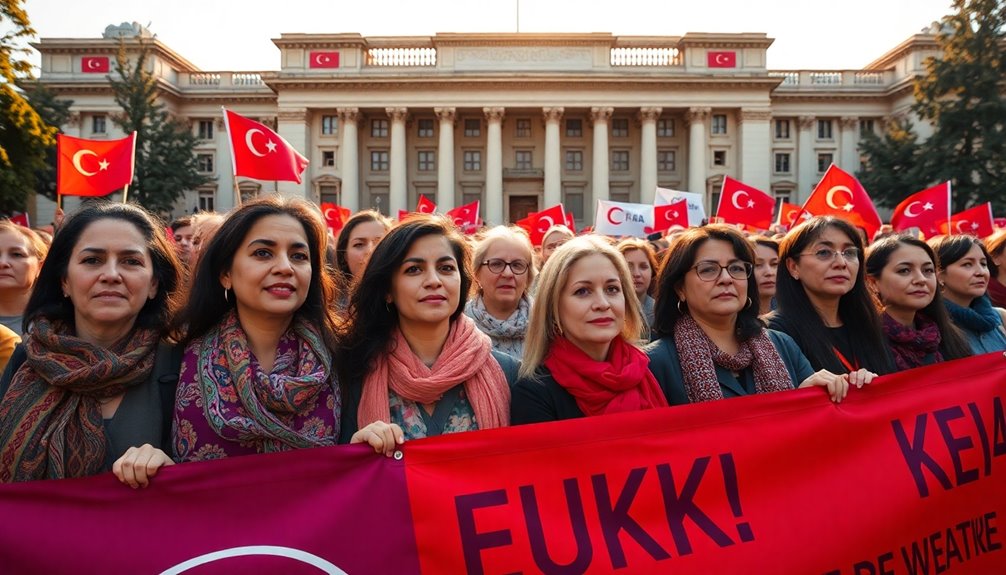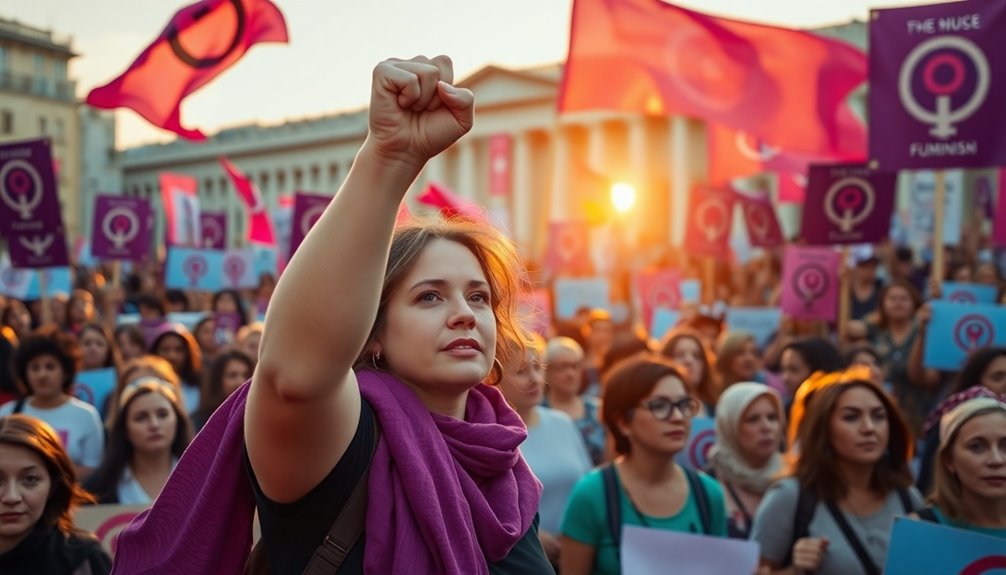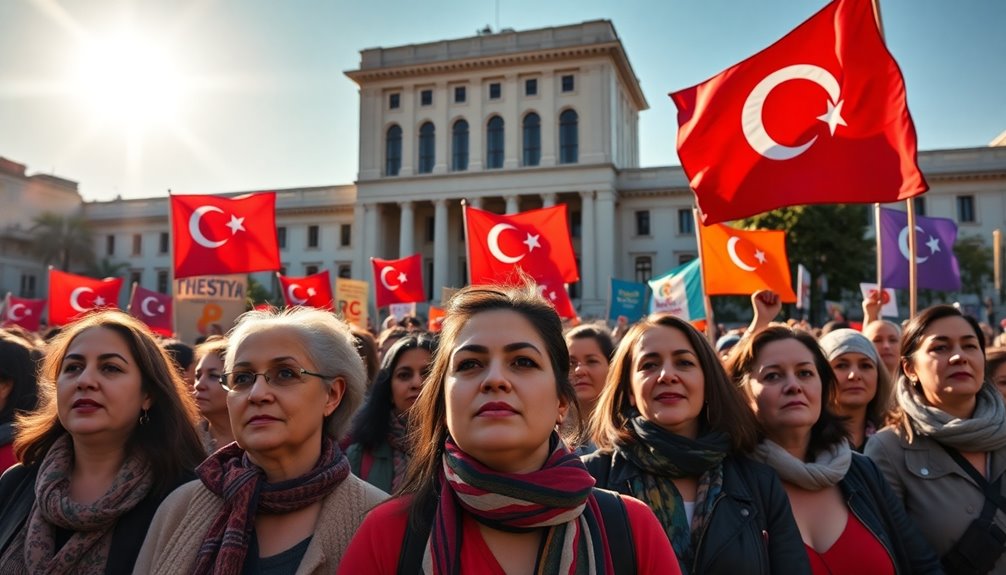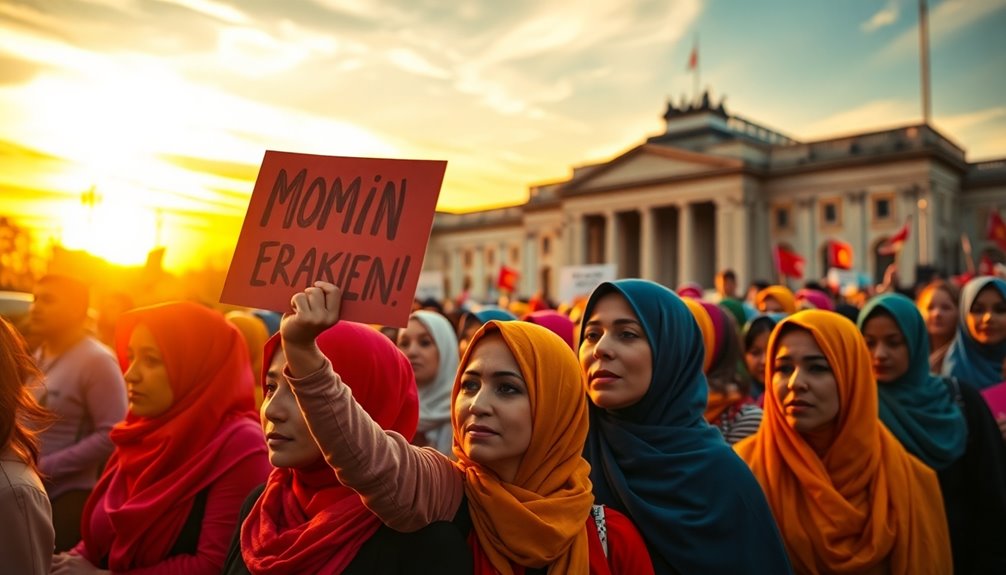Women's rights in Turkey have come a long way, but the battle for equality continues. You'll find a rich history of progress, from women's suffrage in 1934 to recent legal reforms. Despite these advancements, challenges like high femicide rates and inadequate institutional responses persist. Protests highlight the urgency for change and strive to hold authorities accountable. As Turkey faces political shifts that threaten women's rights, many advocate for stronger protections. The struggle is far from over, and there's much more to uncover about the dynamics at play in this ongoing fight for equality.
Key Takeaways
- Historical reforms improved women's access to education and employment, yet modern challenges persist in achieving true equality.
- Legal frameworks, including CEDAW, support women's rights, but Turkey's withdrawal from the Istanbul Convention undermines protection against violence.
- Alarmingly high femicide rates highlight systemic violence, with inadequate institutional responses exacerbating women's vulnerabilities in society.
- Protests and activism reflect a growing demand for urgent legal reforms to protect women's rights and promote gender equality.
- Political challenges, including authoritarianism and exclusion of women's organizations, hinder progress and threaten existing legal protections for women.
Historical Context of Women's Rights

The historical context of women's rights in Turkey reveals a complex evolution shaped by significant reforms and societal changes. Starting with the Ottoman Reform Period, the Tanzimat reforms of 1839 marked the beginning of modernization efforts that recognized women's oppression as a barrier to progress.
By 1914, women gained access to universities, and in 1915, they could work in factories and public service. However, the "family act" of 1917, aimed at limiting polygamy, faced implementation challenges due to wartime conditions.
The Republican Era brought transformative changes under Mustafa Kemal Atatürk after 1923. You'd find the adoption of the Swiss Civil Code in 1926, which abolished polygamy and established civil marriage. Women's suffrage in 1934 marked a significant milestone, as it granted women the right to vote and stand for election, reflecting the progress made during this period.
By December 5, 1934, women earned the right to vote, and in 1935, 18 women took seats in the National Assembly, marking a pivotal moment in political representation.
Post-1980, a new wave of feminism arose, emphasizing real equality beyond formal rights. Activists mobilized against domestic violence, seeking comprehensive legal reforms.
This historical journey highlights the ongoing struggle for women's rights in Turkey, reflecting both achievements and the challenges that remain.
Legal Framework and International Agreements

Turkey's legal framework for women's rights is anchored in both national laws and international agreements, reflecting a commitment to gender equality. Article 10 of the 1982 Constitution explicitly states that women and men have equal rights, placing a duty on the State to implement this equality. Notably, amendments made in 2001 and 2004 strengthened gender equality provisions.
Law No. 6284, enacted on March 8, 2012, aims to protect the family and prevent violence against women, replacing the earlier Law No. 4320. Over the past decade, significant changes in the Turkish Civil Code and Penal Code have aligned these laws with gender equality policies, emphasizing the State's responsibility to ensure equal treatment. Furthermore, Turkey's commitment to international conventions has played a crucial role in shaping domestic legislation on women's rights.
On the international front, Turkey ratified the UN's CEDAW in 1985, committing to eliminate discrimination against women. While Turkey was a pioneer in signing the Istanbul Convention, it withdrew in 2021, raising concerns about compliance with international standards.
The country also adheres to the European Convention on Human Rights and signed the Beijing Declaration in 1995. These legal frameworks and agreements reflect both progress and ongoing challenges in the pursuit of women's rights in Turkey.
Femicide and Violence Against Women

Across Turkey, femicide and violence against women remain pressing issues that demand urgent attention. In 2019, you witnessed the alarming statistic of 474 women murdered, the highest in a decade. Between 2008 and 2019, a staggering 3,185 women lost their lives. Just in the first half of 2024, 205 women were killed, with 117 suspicious deaths recorded.
Most of these tragedies stem from close male relationships—husbands, boyfriends, and fathers often being the perpetrators. In 2023, 65 women were killed simply for wanting autonomy over their lives. The most common motivations behind these murders include rejection of relationships, financial disputes, and deep-seated hatred. Reports indicate a significant discrepancy between government statistics and women's organizations' data, with at least 3,000 women murdered in Turkey over the last decade.
The home is shockingly where 57% of these killings occur, often involving firearms, which were used in 59% of cases in early 2024.
Despite existing laws meant to protect women, the institutional response has been inadequate. Turkey's withdrawal from the Istanbul Convention in 2021 has exacerbated the situation, leaving many women vulnerable. Without serious reforms and enforcement of protections, these horrific acts will continue to plague society.
Protests and Activism

These protests not only signify a demand for immediate action but also reinforce a long-standing movement for women's rights that stretches back to the Ottoman era, reminding everyone of the ongoing battle for equality. The urgency for legal changes to protect women's rights is particularly highlighted by the alarming statistics of over 338 women murdered in Turkey since March 2023.
Political and Institutional Challenges

Political and institutional challenges significantly impede the advancement of women's rights in Turkey. The government's withdrawal from the Istanbul Convention serves as a stark example of how policy reversals undermine efforts to combat gender-based violence. Officials framed this move as a defense of "Turkish values," despite widespread international outcry.
The ruling AKP's increasing authoritarianism has shifted policies to prioritize family protection over women's rights, creating a hostile climate for gender equality. Moreover, secular women's organizations face exclusion from policymaking, as the AKP promotes its own gender agenda through entities like KADEM. Recent municipal elections highlighted the increased representation of women in local governance, showcasing a growing demand for gender equality despite political setbacks.
Institutional changes have eroded previous legal advancements, and the lack of implementation of existing laws leads to systematic failures in addressing domestic violence. Despite initial legal reforms, violence against women remains alarmingly high, with Turkey ranking 130 out of 153 in the Global Gender Gap Index.
Legislative proposals often threaten to reverse progress, like the 2016 Marriage Bill, which would grant impunity to offenders. With the media environment restricted, public discourse on women's rights is stifled, reinforcing regressive gender norms. These political and institutional barriers create significant hurdles in the ongoing battle for women's equality in Turkey.
Frequently Asked Questions
What Role Do Men Play in Women's Rights Activism?
Men play a crucial role in women's rights activism by actively challenging gender stereotypes and advocating for equality.
When you engage in discussions, support events, and promote awareness, you help dismantle patriarchal norms.
By becoming allies, you amplify women's voices and encourage other men to participate.
Your involvement can inspire change and foster environments where gender equity thrives.
Together, you and other men can create a more inclusive society that values everyone's rights.
How Do Cultural Attitudes Affect Women's Rights in Turkey?
Cultural attitudes heavily influence women's rights in Turkey.
You see how traditional views often confine women to roles as homemakers, limiting their access to education and career opportunities. This mindset leads to lower wages and reinforces gender-based discrimination.
When society prioritizes men as breadwinners, it affects women's economic independence.
You'll notice that these attitudes create barriers, making it challenging for women to assert their rights and pursue their aspirations fully.
What Are the Impacts of Economic Factors on Women's Rights?
Economic factors significantly impact women's rights, affecting their ability to participate in the workforce and access financial resources.
You'll notice that women often face barriers like lower labor force participation and limited access to credit, which restricts their economic independence.
Moreover, cultural norms can lead to economic violence, making it harder for women to break free from dependency.
Addressing these issues is crucial for promoting equality and enhancing women's rights in society.
How Can International Support Aid Turkish Women's Rights Movements?
International support can significantly boost Turkish women's rights movements by amplifying their voices and concerns on global platforms.
You can engage in solidarity actions, share awareness through social media, and provide financial resources to local organizations.
By forming partnerships and collaborating on advocacy efforts, you help create a stronger network for change.
Additionally, international pressure on the Turkish government may encourage policy reforms that protect and promote women's rights effectively.
What Strategies Do Women's Organizations Use to Raise Awareness?
Women's organizations use various strategies to raise awareness about crucial issues.
You'll find them launching social media campaigns, like #RaiseYourVoice, reaching millions. They organize community-based initiatives to educate women on their legal rights and conduct training workshops.
Collaborating with local authorities and civil society, they amplify their messages. Additionally, they create informative websites and utilize outdoor advertising to engage the public, ensuring everyone understands the urgency of addressing violence against women.
Conclusion
In Turkey, the fight for women's rights remains a vital struggle that demands your attention and action. Despite legal frameworks and international agreements, challenges like femicide and systemic violence persist. You can support protests and activism, amplifying the voices of those advocating for equality. By staying informed and engaged, you help push for change and create a society where women's rights are respected and upheld. Together, let's continue the battle for a fairer future.










